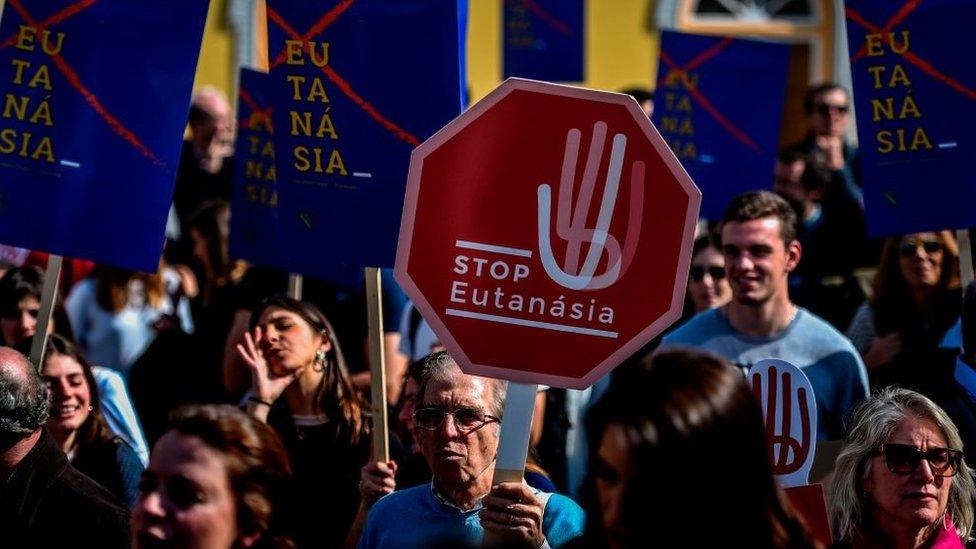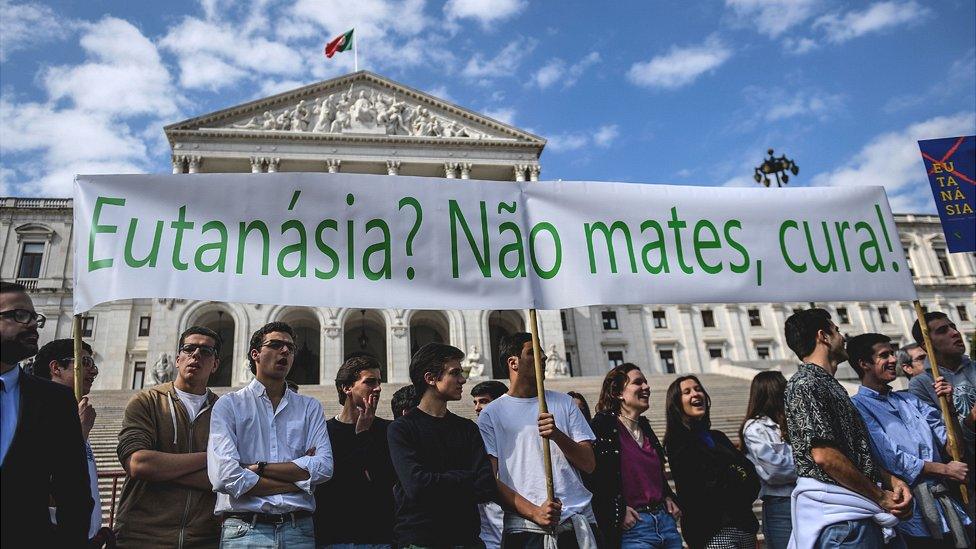Portugal euthanasia: Parliament backs assisted suicide bill
- Published

Polls suggest around half of Portugal is in favour of allowing medically assisted suicide, but the Catholic church is strongly opposed
Portugal's parliament has approved legislation to allow medically assisted suicide in limited circumstances.
Once enacted, the bill would allow this form of euthanasia if an adult's wish to die is "current and reiterated, serious, free and informed".
The person must be "in a situation of great intensity suffering, with definitive injury of extreme gravity or serious and incurable disease".
The measure has parallels in only a handful of countries worldwide.
MPs voted 126 to 84 in favour, with all but seven members of Portugal's governing Socialist Party, which has a majority in parliament, backing the bill, as did some opposition members.
But other opposition politicians called on Portugal's conservative president, Marcelo Rebelo de Sousa, to send the text for constitutional review, as he did with a previous version. They allege there are still problems with the bill.
Once the president receives the final text, he can sign it into law, send it to the Constitutional Court within eight days, or exercise his veto within 20 days. A veto can, however, be overturned by a majority of members of parliament.
He has already said he will be quick to announce his decision.
This is the third time that a bill to allow euthanasia has made it through all parliamentary stages. The first was in early 2020, when the president sent it to the Constitutional Court, which upheld some of his concerns.
He then vetoed an amended version that had sought to take on board the court's objections, arguing that the various clauses describing terminal conditions were contradictory and needed clarification.
Since he soon afterwards dissolved parliament and called a snap election, members had no chance to overturn his veto, as they could have done, meaning that the legislative process went back to square one.
January's election handed the Socialist Party of Prime Minister António Costa 120 of the 230 seats in the new parliament, with other left parties that strongly back the reform together amassing seven seats.
Following months of wrangling, the latest version of the euthanasia bill was approved in committee on Wednesday, despite a last-ditch call for a referendum by the largest opposition party, the centre-right Social Democrats (PSD).
Opinion polls indicate roughly half of voters in this overwhelmingly Catholic country are in favour of allowing medically assisted suicide, which the Church strongly opposes.
But the PSD's demand to suspend the legislative process and hold a referendum was rejected, paving the way for Friday's final reading.
In a statement after Friday's vote, the Portuguese Bishops' Conference described the legalisation as a "serious threat to humanity".
But Isabel Moreira, a Socialist MP and one of the bill's authors, said that "the people insisted" that the reform be approved.
The text is very similar to the version blocked by the president last November, although requirements were added for there to be a minimum period of two months from when a request for help to die is made and a psychological assessment of the person making it.
Under English law, euthanasia is illegal and is considered manslaughter or murder.
It is fully legal in three European countries: Belgium, Luxembourg and the Netherlands. But assisted death and passive euthanasia - of various types - are legal in many more European countries.
You may also be interested in:
'Why I'm ending my life, while I still can'
Related topics
- Published21 February 2020
